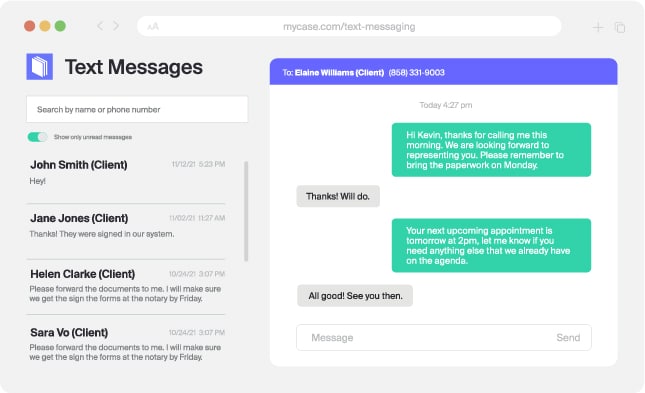The Ethical Guide to Lawyers Texting Clients

Effective client communication is the foundation of a successful client-attorney relationship. But, the way people talk and connect to each other has changed significantly in the online age, and many of today’s clients prefer the speed and convenience of digital communication like text message, email, or chat over a phone call.
Unlike in other industries, communication in law comes with specific risks if handled incorrectly, which applies even more so to digital channels. While texting is an everyday event for most of us, how can lawyers text clients while staying fully within ethical and compliance guidelines for legal communications?
In this article, we’ll give you an in-depth guide into the potential security, ethics, and compliance issues surrounding lawyer text messages, what you can do to streamline and safeguard client texting, along with some best practices and tools your firm can use for ethical client texting.
Are Lawyers Allowed to Text Their Clients?
There is some uncertainty among lawyers whether or not they are allowed to send or receive texts from clients. In short, yes – lawyers that have established attorney-client privilege can communicate via text messaging.
According to the ABA’s Model Rules of Professional Conduct, part of displaying professional competence is to “keep abreast of changes and the law and its practice, including the benefits and risk associated with relevant technology.”
In other words, as technology like text messaging becomes more ubiquitous, use it is an ethical way to better serve your clients—as long as it’s used responsibly.
Benefits of Lawyers Texting Clients
Texting is one of the most popular forms of communication, and using it at your law firm is one of the ways you can stand out by offering exceptional client services.

When it comes to digital communication methods, it’s often not a question of which one to use but when to use it.
For instance, when sending long-form or detailed messages, an email or message through a secure messaging portal is still your best option. However, a quick text message from an attorney may save time and be more effective than an email. Overall, text messages provide a number of distinct advantages for law firms.
Widespread Use Among Different People
Compared to other digital communication channels, text messaging is more widely used by people around the world. This includes older generations of Americans and people who are less tech-savvy. According to a report published by the Consumer Affairs Research Team, 97% of Americans own a mobile phone. Since every phone comes with built-in SMS texting capability, clients texting attorneys is a great mobile messaging choice for those who don’t have access to smartphone apps or simply aren’t comfortable using them.
Faster Communication Speed From Anywhere
Sending a text is a quick way to communicate on the go, which is especially helpful when an attorney is working remotely or caught up in other work. Providing small updates via text is a great low-effort way to keep clients engaged and get a quick response.
Not only that, but texting can be a faster option for reminding clients about upcoming meetings, documents, or other more detailed issues. Used in these ways, texting can be another valuable piece of the overall toolkit in an effective law firm client management strategy.
Keeps Clients Happy
Frequent and meaningful communication is a vital part of building an exceptional client experience. Compared to text or mobile messaging, emails can feel formal and phone calls can present a big challenge for both a lawyer’s and a client’s schedule.
In fact, many clients prefer texting to other communication methods. Not only are you more likely to get a quick response via text or mobile messaging, but it can also cut down on client dissatisfaction by reducing the number of billable hours spent on longer communications.

Drive More Effective Marketing
Used correctly (and in a way that’s compliant with TCPA and the CAN-SPAM Act), text messaging is a great way to supplement your law firm’s lead generation and marketing efforts. Many legal client relationship management software includes ways to send automated text message follow-ups to potential clients to keep them engaged–which is vital in a time when most people expect a response from businesses within 24 hours.
Ethical Considerations for Lawyers Texting Clients
Text messaging is a great way to reach clients since it is so widely used even among older, or less tech-savvy users. However, just because lawyer text messaging is technically allowed doesn’t mean it should be used in all instances.
Additionally, unlike other, more secure forms of digital communication, text messages come with unique ethical considerations.
Confidentiality and Security
It is every lawyer’s duty to do their best to ensure that all documents, communications, and everything else pertaining to a client’s case is kept confidential and digitally secure. At a minimum, a law firm must use an SMS provider that encrypts all messages and data.
With text, there is also a much higher risk of inadvertent disclosure than with a secure legal messaging app or even email. For instance, if you or a client has message previews turned on on their smartphone, another person could potentially read the content of a message without meaning to. That is why text messaging can be more useful as a reminder tool than a primary communication tool.
In other words, sending over the content of a document via mobile message opens up potential ethical concerns–whereas sending an automatic text reminder to review the document on a secure document portal does not.
Record Keeping
One of the biggest ethical missteps a law firm can make is when lawyers text clients from their personal phone. In addition to increasing the risk of leaking confidential client information, texting from a personal device doesn’t necessarily keep a record of every text message. This is why it is vital that lawyers use a secure and centralized SMS tool for texting so that every text is documented in the event of a dispute. Ideally, your SMS tool should be integrated with legal case management software in order to ensure every client communication (including emails, texts, etc.) is secure and included within the client’s file.

Serving Client Needs
Anytime you consider sending a text, you need to weigh whether the information included in the message is appropriate to send over text. One of the most important points, as laid out by the code of conduct for lawyers, is that an attorney should only use technology when it serves their client’s best interests. In many cases, a quick text message is a useful tool to keep clients informed, but it always has to be balanced with any associated security and confidentiality risks. Establishing which client communications are and aren’t suitable for SMS and being consistent with its use across your organization is vital to staying within legal ethics guidelines.
How Can You Ethically Use Texting In Your Law Firm?
Without a doubt, texting is useful for law firm client communication and marketing. But how can you ensure that your SMS texting remains within legal and ethical rules? The first step is using an appropriate texting service instead of a lawyer’s personal phone.
Beyond the texting tool itself, here are a few additional tips:
Decide What to Text (And What Not To)
To stay relevant, firms have to adapt to their client’s technology and communication preferences. However, setting clear expectations (both for your firm and clients) on what types of information will or won’t be communicated over text is key. Additionally, since texting has more risks surrounding accidental disclosure, setting up a one-way texting service (i.e. you can send a message, but the client cannot reply) can be another good way to minimize risk.
Lawyers texting clients is ideal for things like:
- Meeting and court date reminders
- Billing reminders
- Quick case updates
- Requests for document review
- Scheduling reminders
- Marketing
Texting is particularly useful when it’s automated as part of a modern case management solution–ultimately helping you keep clients updated more effectively and cutting down on the risk of client communication falling through the cracks.
Make Sure the Client Is On Board
In many ways, a successful attorney-client relationship is built on a mutual set of expectations. As more communication becomes digital and automated, setting clear expectations for how you’ll be using communication technology from the get-go is more important than ever. In terms of texting, clients should know:
- When they can expect to send/receive texts
- When texts will be automated or from a person
- What types of topics are (and aren’t) appropriate for text
- What charges may be associated with texting
As with all parts of client and attorney agreements, the terms for how texting is used should be set out in writing to avoid any unwanted surprises.
How to Choose the Right Texting Service for Lawyers
When selecting a text message service for lawyers, you should always look for something that fits seamlessly within your other operations. That is why we always recommend using a technology partner that integrates with your case management and legal billing solutions. At a bare minimum, you need a texting service that ensures every message is:
- Secure
- Documented
The best way of ensuring your client texts are ethical is by using the built-in texting capabilities in a modern legal case management solution like MyCase. This ensures that any texting is following legal best practices and that any SMS messages are seamlessly combined into your other documentation and operational workflows.

To see what this looks like in action, take a look at MyCase’s built-in text messaging video.
Connect Easily With Clients Using Secure Legal Text Messaging
Text messaging is one of the most widely used communication tools and to not use it is to miss opportunities to increase client engagement and boost efficiency. When choosing law firm communications software, make sure you partner with a technology partner that offers texting that is both convenient and secure.
MyCase’s industry-leading legal case management software is designed by legal professionals for legal professionals to improve client communication, organization, and more. Law firms across the country leverage MyCase to streamline their client communications by combining our easy-to-use and fully compliant texting solution with:
- Automated Time-Tracking
- Digital Payment Processing
- Secure Document Portal
- Calendaring
- And more
To see how MyCase can help you easily communicate with clients from anywhere, schedule a demo today.




